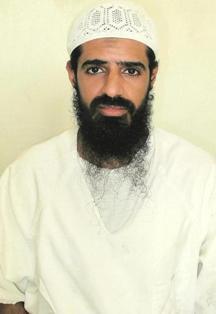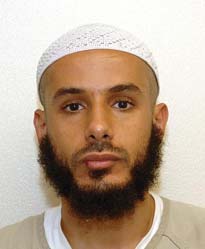
Khalid Sheikh Mohammed is a Pakistani Islamist militant held by the United States at the Guantanamo Bay detention camp under terrorism-related charges. He was named as "the principal architect of the 9/11 attacks" in the 9/11 Commission Report.

Walid Muhammad Salih bin Mubarak bin Attash is a Yemeni prisoner held in extrajudicial detention at the United States' Guantanamo Bay detention camp and is suspected of playing a key role in the early stages of the 9/11 attacks.

Mohammed Mani Ahmad al-Qahtani is a Saudi citizen who was detained as an al-Qaeda operative for 20 years in the United States's Guantanamo Bay detention camps in Cuba. Qahtani allegedly tried to enter the United States to take part in the September 11 attacks as the 20th hijacker and was due to be onboard United Airlines Flight 93 along with the four other hijackers. He was refused entry due to suspicions that he was trying to illegally immigrate. He was later captured in Afghanistan in the battle of Tora Bora in December 2001.

Salim Ahmed Hamdan is a Yemeni man, captured during the invasion of Afghanistan, declared by the United States government to be an illegal enemy combatant and held as a detainee at Guantanamo Bay from 2002 to November 2008. He admits to being Osama bin Laden's personal driver and said he needed the money.
Fouad Mahmoud al Rabiah is a Kuwaiti, who was held in the United States Guantanamo Bay detainment camps, in Cuba from May 2002 to December 2009. Al Rabia's Guantanamo Internment Serial Number was 551.

Fouzi Khalid Abdullah Al Odah is a Kuwaiti citizen formerly held in the United States Guantanamo Bay detainment camps, in Cuba. He had been detained without charge in Guantanamo Bay since 2002. He was a plaintiff in the ongoing case, Al Odah v. United States, which challenged his detention, along with that of fellow detainees. The case was widely acknowledged to be one of the most significant to be heard by the Supreme Court in the current term. The US Department of Defense reports that he was born in 1977, in Kuwait City, Kuwait.

Faiz Mohammed Ahmed al-Kandari is a Kuwaiti citizen who was held in extrajudicial detention in the United States' Guantanamo Bay detainment camp in Cuba, from 2002 to 2016. He has never been charged with war crimes.

Saifullah Abdullah Paracha is a citizen of Pakistan who was held, without any charge, in the United States Guantanamo Bay detainment camps, in Cuba for over 18 years. He was released on October 29, 2022. As of 18 May 2021, Saifullah Paracha was approved for release by American authorities after his son Uzair Paracha's conviction was overturned in 2018 and the younger Paracha was repatriated to Pakistan in March 2020.
Samir Naji al Hasan Moqbel is a citizen of Yemen who was held in extrajudicial detention in the United States's Guantanamo Bay detention camps, in Cuba. His Guantanamo Internee Security Number was 043. The Department of Defense reports Moqbel was born on December 1, 1977, in Taiz, Yemen.

Khalid Mahomoud Abdul Wahab Al Asmr is a citizen of Jordan who was held in extrajudicial detention in the United States Guantanamo Bay detainment camps, in Cuba.
Abdullah Tabarak Ahmad is a citizen of Morocco, held in extrajudicial detention in the United States Guantanamo Bay detainment camps, in Cuba.
Khalid al-Odah is the father of Guantanamo Bay detainee, Fawzi al-Odah, and the founder of the Kuwaiti Family Committee, a group established in 2004 to heighten global awareness of the prisoners in Guantanamo Bay. Over the past five years, Khalid has waged legal, media, and public relations campaigns to promote the need for due process for the prisoners at Guantanamo. In 2004, Khalid brought his son's case to the Supreme Court Rasul v. Bush/ al-Odah v. Bush.

Moath Hamza Ahmed al-Alwi is a citizen of Yemen, held in extrajudicial detention in the United States Guantanamo Bay detainment camps, in Cuba. His detainee ID number is 28. Guantanamo analysts estimated he was born in 1977, in Bajor, Yemen.

Ali Hamza Ahmad Suliman al-Bahlul is a Yemeni citizen who has been held as an enemy combatant since 2002 in the United States Guantanamo Bay detention camp. He boycotted the Guantanamo Military Commissions, arguing that there was no legal basis for the military tribunals to judge him.

Sharqawi Abdu Ali al-Hajj, also known as Riyadh the Facilitator, is a Yemeni alleged Al-Qaeda associate who is currently being held in the United States' Guantanamo Bay detention camps, in Cuba.

Ayman Saeed Abdullah Batarfi is a Yemeni doctor who was held in extrajudicial detention in the United States Guantanamo Bay detention camps, in Cuba. His Guantanamo Internment Serial Number was 627.
Khalid Sulaymanjaydh Al Hubayshi is a citizen of Saudi Arabia who was held in extrajudicial detention in the United States Guantanamo Bay detention camps, in Cuba. Al Hubayshi, who acknowledged some jihadists' activity, spent three years in Guantanamo, a further years in Saudi Arabia's al-Ha'ir Prison, prior to graduating from the Saudi jihadist rehabilitation program. Several western journalists have interviewed him, and accepted that he appears to have successfully reintegrated into the mainstream of Saudi society.
A group of prisoners at the Guantanamo Bay detention camp, the Dirty Thirty were believed to be the "best potential sources of information" and consequently the chief focus of the harshest methods of interrogation. Many of these captives were alleged to be Osama bin Laden bodyguards, or associates of Osama bin Laden.
The Guantánamo Bay files leak began on 24 April 2011, when WikiLeaks, along with The New York Times, NPR and The Guardian and other independent news organizations, began publishing 779 formerly secret documents relating to detainees at the United States' Guantánamo Bay detention camp established in 2002 after its invasion of Afghanistan in 2001. The documents consist of classified assessments, interviews, and internal memos about detainees, which were written by the Pentagon's Joint Task Force Guantanamo, headquartered at Guantanamo Bay Naval Base. The documents are marked "secret" and NOFORN.












